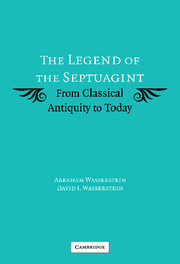Book contents
- Frontmatter
- Contents
- Preface and Acknowledgments
- Abbreviations
- Introduction
- 1 The Letter of Aristeas
- 2 The Hellenistic Jewish Tradition
- 3 The Rabbis and the Greek Bible
- 4 The Ptolemaic Changes
- 5 The Church Fathers and the Translation of the Septuagint
- 6 Among the Christians in the Orient
- 7 The Muslims and the Septuagint
- 8 Yosippon and the Story of the Seventy
- 9 Karaites, Samaritans and Rabbanite Jews in the Middle Ages
- 10 The Septuagint in the Renaissance and the Modern World
- Conclusion
- Appendix: In Partibus Infidelium: Zosimus of Panopolis
- Bibliography and Sources
- Index
6 - Among the Christians in the Orient
Published online by Cambridge University Press: 17 July 2009
- Frontmatter
- Contents
- Preface and Acknowledgments
- Abbreviations
- Introduction
- 1 The Letter of Aristeas
- 2 The Hellenistic Jewish Tradition
- 3 The Rabbis and the Greek Bible
- 4 The Ptolemaic Changes
- 5 The Church Fathers and the Translation of the Septuagint
- 6 Among the Christians in the Orient
- 7 The Muslims and the Septuagint
- 8 Yosippon and the Story of the Seventy
- 9 Karaites, Samaritans and Rabbanite Jews in the Middle Ages
- 10 The Septuagint in the Renaissance and the Modern World
- Conclusion
- Appendix: In Partibus Infidelium: Zosimus of Panopolis
- Bibliography and Sources
- Index
Summary
The rise of Islam caused profound changes in the whole of the Near East. The one most relevant for our concern here is the linguistic. Within some three hundred years of the initial conquests of Islam, the principal language, literary and to a great degree also spoken, over most of the Near East was Arabic. This transformation affected both Muslims and non-Muslims, though in different ways. For Christians, it meant a gradual distancing from the cultural equipment of the Hellenic–Christian past. As this heritage was expressed mainly in Greek or in Syriac, the move to Arabic meant that only those elements in it that were translated into that language, or otherwise capable of cultural and linguistic transformation, could survive. For Jews, it meant the addition of yet another linguistic dress to those of the past, and they lost little or nothing of the literary corpus expressed in other languages. Indeed, the addition of Arabic to their linguistic armoury, like other such additions in the past, made possible cultural openness which proved of immense benefit to Jewish culture in many ways. Among Muslims, themselves largely descendants of pre-Islamic Near Eastern Christians, the use of Arabic for literary expression meant that the cultural baggage inherited from earlier times and other cultures faced the twin needs of translation and reformulation. The Bible did not have, could not have, the same status or the same meaning for Muslims as it did for Christians and Jews.
- Type
- Chapter
- Information
- The Legend of the SeptuagintFrom Classical Antiquity to Today, pp. 132 - 173Publisher: Cambridge University PressPrint publication year: 2006

